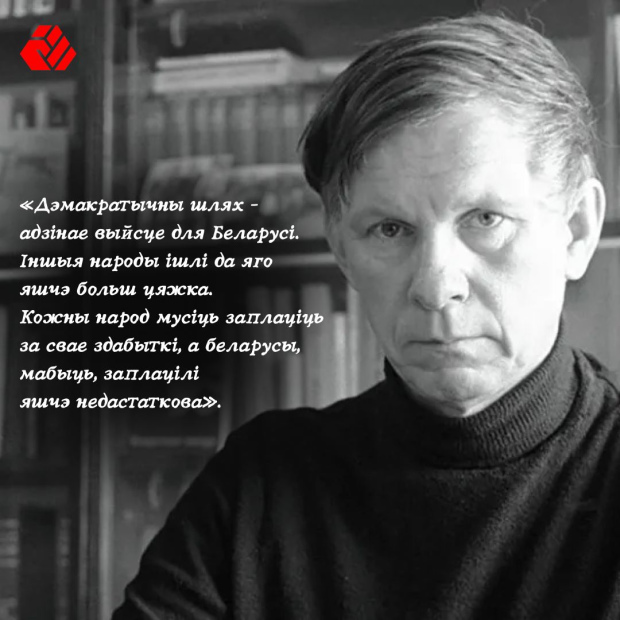June 19 marks the 100th anniversary of the birth of the famous Belarusian writer, Vasil Bykau.
He was not just one of many authors who wrote about World War II in the so-called "lieutenant's prose" genre. He was among the founders of this genre. The main theme of Vasil Bykau's stories is the psychological drama of the hero in the most challenging life circumstances.
A classic of our literature, one of the most prominent Belarusian authors of the second half of the last century, he was born in the village of Bychki in the Ushachsky district to a peasant family. World War II, which caught him as a teenager, had a huge impact on the writer's work. Bykov went through the entire war, participating in battles for Ukraine, Romania, Bulgaria, Hungary, Yugoslavia, and Austria. He was severely wounded. After returning from the army, he found himself in literature. His books have been translated into more than 50 languages. Vasil Bykau was nominated for the Nobel Prize.
In the last years of his life, Vasil Bykau turned to the genre of short allegorical stories. In which, however, the historical tragedy of Belarus is unmistakably guessed. The pain for the future of the country is also heard in the writer's memoirs — "Long Road Home."
Vasil Bykau was a patriot of Belarus and sincerely welcomed the democratic changes and the gaining of independence in the early 90s of the last century. However, soon, his earlier optimism was replaced by more gloomy thoughts. This was influenced by the election of the first president of Belarus and political changes in the country.
"Our failure does not mean that we should sprinkle our heads with ashes, abandon our goals or seek an easier path. The democratic path is the only way out for Belarus. Other nations have had an even harder time achieving it. Every nation must pay for its achievements, and Belarusians, perhaps, have not paid enough yet," Bykau said in 1997.
"The national idea is an important factor of progress, or even of physical existence in the world. It is a classical idea, the realization of which many countries of the world have long achieved, building their national destiny on it. And Belarusians are still debating whether it is worth striving for? The enemies of Belarusian identity, of course, argue that it is not worth it, that there is a better idea — slavery and dependence, which provides bread. (And gasoline, and gas, and consumer goods.) Almost like in the Bible: conquer us, but feed us," said the writer in 2002.
Vasil Bykau went through persecution by the Lukashenko regime, lived abroad for some time, but at the end of his life, already seriously ill, returned to Belarus. The writer died on June 22, 2003. His coffin was draped with the white-red-white flag at the farewell ceremony.
Friends, on the 100th anniversary of the birth of the national writer of Belarus, Vasil Bykau, join the events dedicated to this date. Also, read one or more of his books.
He was not just one of many authors who wrote about World War II in the so-called "lieutenant's prose" genre. He was among the founders of this genre. The main theme of Vasil Bykau's stories is the psychological drama of the hero in the most challenging life circumstances.
A classic of our literature, one of the most prominent Belarusian authors of the second half of the last century, he was born in the village of Bychki in the Ushachsky district to a peasant family. World War II, which caught him as a teenager, had a huge impact on the writer's work. Bykov went through the entire war, participating in battles for Ukraine, Romania, Bulgaria, Hungary, Yugoslavia, and Austria. He was severely wounded. After returning from the army, he found himself in literature. His books have been translated into more than 50 languages. Vasil Bykau was nominated for the Nobel Prize.
In the last years of his life, Vasil Bykau turned to the genre of short allegorical stories. In which, however, the historical tragedy of Belarus is unmistakably guessed. The pain for the future of the country is also heard in the writer's memoirs — "Long Road Home."
Vasil Bykau was a patriot of Belarus and sincerely welcomed the democratic changes and the gaining of independence in the early 90s of the last century. However, soon, his earlier optimism was replaced by more gloomy thoughts. This was influenced by the election of the first president of Belarus and political changes in the country.
"Our failure does not mean that we should sprinkle our heads with ashes, abandon our goals or seek an easier path. The democratic path is the only way out for Belarus. Other nations have had an even harder time achieving it. Every nation must pay for its achievements, and Belarusians, perhaps, have not paid enough yet," Bykau said in 1997.
"The national idea is an important factor of progress, or even of physical existence in the world. It is a classical idea, the realization of which many countries of the world have long achieved, building their national destiny on it. And Belarusians are still debating whether it is worth striving for? The enemies of Belarusian identity, of course, argue that it is not worth it, that there is a better idea — slavery and dependence, which provides bread. (And gasoline, and gas, and consumer goods.) Almost like in the Bible: conquer us, but feed us," said the writer in 2002.
Vasil Bykau went through persecution by the Lukashenko regime, lived abroad for some time, but at the end of his life, already seriously ill, returned to Belarus. The writer died on June 22, 2003. His coffin was draped with the white-red-white flag at the farewell ceremony.
Friends, on the 100th anniversary of the birth of the national writer of Belarus, Vasil Bykau, join the events dedicated to this date. Also, read one or more of his books.


 Continue
Continue
